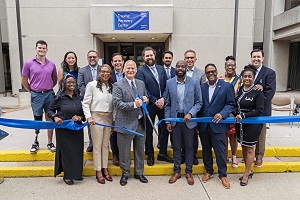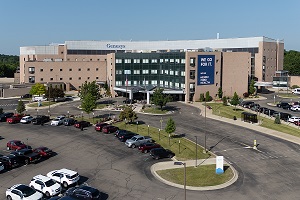First Trauma Recovery Center in Michigan Opens to Survivors

Michiganders who survive violent crime, car crashes, household accidents and other traumatic injuries now have a place to heal not just physically, but emotionally, as Henry Ford Health begins accepting patients at the first Trauma Recovery Center (TRC) in the state of Michigan.
Henry Ford team members, trauma survivors, community partners and elected officials celebrated the important new resource today with a ribbon cutting ceremony.
“In order to achieve health equity, in order to lift up all those we serve, we have to have the ability to take care of the entire person,” said Dr. Steven Kalkanis, Henry Ford Health Executive Vice President and CEO of Henry Ford Hospital and the Henry Ford Medical Group. “We can heal someone physiologically and physically, but for them to be completely healed and be productive members of our community we need to help heal their psychological injuries. They need resources, and I’m exceptionally proud of the team that is making those resources available at Henry Ford Health’s Trauma Recovery Center.”
The TRC is a one-stop shop for connecting survivors of trauma with mental health services, legal assistance, education, and more free of charge after they leave the hospital.
“When we are ready to discharge patients from the hospital they are a long way from reaching their full recovery,” said Dr. Jeffrey Johnson, who serves as Trauma Medical Director and staff surgeon at Henry Ford Hospital in Detroit. “Many of them are returning to environments that led them to get hurt in the first place. Many are at risk for severe psychological aftereffects. Employment, housing, financial and family challenges are the norm in this group. To help climb these barriers we envisioned our trauma recovery center at Henry Ford Health.”
Recognizing that especially in Detroit, which has historically had some of the worst violent crime in the country, there needed to be a better way to support trauma survivors, a team at Henry Ford Health began to lay the groundwork for the TRC in 2021. In 2023, Michigan lawmakers passed House Bill 4437, allocating $4 million in federal funds for the establishment of two TRC programs in Michigan and paving the way for today’s celebration.
The state funding allowed Henry Ford to hire a multi-disciplinary team of psychologists, psychiatrists and social workers to staff the TRC and serve survivors from across Michigan throughout their recovery. The TRC team is also recruiting trauma survivors to serve as peer mentors.
One in four Michiganders have been the victim of crime in the past 10 years and many report experiencing trauma as a result. Yet, according to a recently released national report, less than one in three crime victims receive help to recover. Issues related to health insurance or lack of access to behavioral health services and providers tend to be the biggest barrier to mental health services.
“The TRC is an answer. It is a transformational solution,” said Dr. Kimberlydawn Wisdom, Senior Vice President and Chief Wellness & Diversity Officer for Henry Ford Health. “We are in a position where instead of just addressing a problem, healthcare providers and policy makers have come together with an actual, evidence-based solution that is proven to produce results.”
Studies have shown that crime survivors who receive services at the more than 50 TRCs across the U.S. are 56 percent more likely to return to work, and victims served by a TRC are more likely to file a police report. The TRC model costs 34 percent less than a traditional fee for service model, and crime victims saw a more than 40 percent reduction in their symptoms of PTSD and depression following TRC services.
“I’m proud to see the TRC model expanding to Detroit,” said Aswad Thomas, vice president of Alliance for Safety and Justice, a leading advocate for TRCs and other victim-centered public safety solutions nationwide. “As a gun violence survivor, I understand firsthand the support that’s needed to heal and recover after victimization. All Detroit crime survivors now have access to that support through the Henry Ford Health’s Trauma Recovery Center.”
“The TRC model is as innovative as it is effective,” said Gena Castro-Rodriguez, executive director of the National Alliance of Trauma Recovery Centers. “By providing access to free trauma recovery services, crime survivors are given an opportunity to grow past their traumas and reach stability after victimization. This is how we break cycles of community violence and improve safety for everyone.”
Any provider can refer patients to the TRC, which is based out of Henry Ford’s clinic at One Ford Place. If you or someone you know may benefit from support services offered through the TRC, or you are interested in supporting trauma survivors as a peer mentor, email TRC@hfhs.org.
###
MEDIA CONTACT: mediarelations@hfhs.org
.svg?iar=0&hash=F6049510E33E4E6D8196C26CCC0A64A4)

/hfh-logo-main--white.svg?iar=0&hash=ED491CBFADFB7670FAE94559C98D7798)





